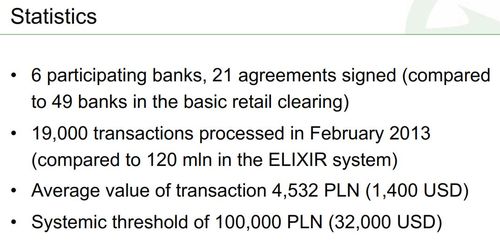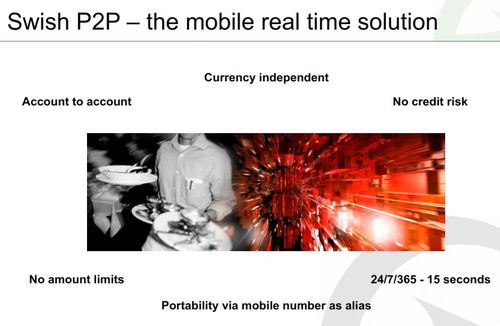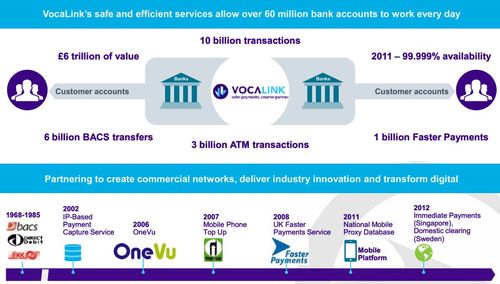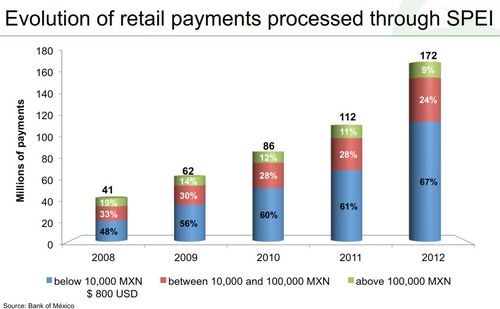
This is a question that comes up more and more, and there’s
an easy answer: it’s very important; and a harder answer: it’s not always
important; and this is a key discussion in the context of immediate payments, something
that is getting talked about more and more.
In fact, my friends over at Glenbrook covered this at the
recent NACHA Conference in San Diego. They ran a panel with
guests from Bankgirot in
Sweden, KIR in
Poland, VocaLink in the U.K.
and the Banco de México,
with these infrastructures all outlining their offers and strengths.
Purely for objectivity, here’s one slide from each that
speaks volumes.
KIR in Poland developed real-time payments and settlement a
year ago (this is different ot most other systems, where it’s just real-time payment
with settlement following at a later time) but, interestingly, it’s a lightly
used system right now.

In Sweden, they do real-time payments 24*7*365 in 15
seconds, but have taken this one step further by launching the Swish app.

Swish was developed on top of Bankgirot’s real-time payments
service thorugh a cooperation between Sweden’s six largest banks: Danske Bank,
Handelsbanken, Länsförsäkringar Älvsborg, Nordea, SEB and Swedbank. The app
allows immediate payments using mobile apps and internet banking.
Perhaps the easiest way to understand it is through the words
used during its launch in the Swedish journal, The Local.
“Imagine you want to
sell a bike,” Danske Bank spokesman
Erik Kristow told The Local. “But you don’t want to hand it over until you see
the money. Well, I could simply ‘Swish’ you the amount with my phone,
you could see it enter your account in
real time. Then I could cycle off with my new bike.”
Swish, a mobile payment service launched
last week, is even a world first according to Head of Channels at Danske Bank,
Daniel Wahlstrom.
"This is unique
because of the collaboration of the banks, and the fact that the money is
instantly transferred from one bank account to the
other,” he said.
"Many of the
other systems around the world rely on a credit card platform,
whereas Swish works via your own salary account, and you can see the
transaction as soon as it's happened."
The app was developed in collaboration between the six largest banks in Sweden:
Danske Bank, Handelsbanken, Länsförsäkringar Bank, Nordea, SEB and Swedbank, their
biggest cooperation in 50 years.
According to Nordea
spokesman Ragnar Roos, Swish thrives in person-to-person transactions where an
exact cash figure is needed.
“People have smaller
amounts of money to transfer and often don’t want to use cash. Swish is more
useful than cash, especially in situations where you find yourself splitting
the bill at dinner, for example," he told The Local.
“It’s not a service
for shops, it’s strictly between people. It even works for transactions on
sites like Blocket,” he
said, referring to the popular Swedish buy-sell site.
Users simply need to
connect their mobile number with their internet banking service, and then
download the Swish service to their phones using Mobile Bank-ID.
The UK will be getting a similar app next year, as the banks
launch their mobile payments service for P2P real-time payments via VocaLink.
VocaLink has had faster payments for five years now, and my favourite slide from their deck is this one (doubleclick image to enlarge):

All you need to know about VocaLink in one slide.
Finally, the Bank of Mexico has a hybrid real-time payments
system for high and low value payments called SPEI. Launched in 2008, its now processing around
200 million transactions per annum.

As can be seen, immediate payments is becoming a de facto
backbone for many transaction processing infrastructures.
Anyways, in preparing for the NACHA debate, Glenbrook preformed
a short online survey of how important is real-time for payments, and the
results are intriguing.
Admittedly, only 89 people responded, but Elizabeth McQuerry
from Glenbrook summarises the results as follows:
How fast is fast enough?
Nearly half (49%) responded that immediate funds transfer (faster
or real-time payments if you prefer) should have immediate messaging and
settlement, just over a third (36%) said immediate messaging and batched
settlement several times a day was fast enough while 15% said immediate
messaging with next day settlement would do just fine.
74% thought that person-to-person payments were most important
for growth but, notably, respondents felt that real-time was similarly important
for growth in Point of Sale (70%) payments and Remote payments (69%) like
e-commerce. On the other hand, only 41% of respondents felt that faster
payments were important for bill payments.
The biggest obstacle to faster payments is financial
institution opposition due to operational issues/demands (67% of respondents)
along with financial institution opposition due to cannibalization of existing
revenues (28%).
You can get a free copy of the ACH presentations and
Glenbrook survey results here.
Finally, a good example of how important real-time is in my
daily life.
I have a car that is now five years old with inbuilt
satellite navigation that is meant to get real-time updates of live traffic
flows.
It somewhat surprises me therefore, the number of times I’m
stuck in traffic. I think it’s because
it only gets updates of major traffic disruptions on the freeways rather than
on the backroads.
So I was driving the other day and picked up google maps on
my smartphone, to double check the route my car was directing me. Amazingly, and before I knew it, the phone
was using the car’s Bluetooth link to tell me to turn left and right, against
the direction of my car’s satellite navigation.
Sure enough, I reached my destination 15 minutes earlier
than I would have if I had followed the car’s near real-time service.
In other words, if the early bird catches the worm, you’re
far better being real-time as you’ll always be earlier.
Chris M Skinner
Chris Skinner is best known as an independent commentator on the financial markets through his blog, TheFinanser.com, as author of the bestselling book Digital Bank, and Chair of the European networking forum the Financial Services Club. He has been voted one of the most influential people in banking by The Financial Brand (as well as one of the best blogs), a FinTech Titan (Next Bank), one of the Fintech Leaders you need to follow (City AM, Deluxe and Jax Finance), as well as one of the Top 40 most influential people in financial technology by the Wall Street Journal's Financial News. To learn more click here...

